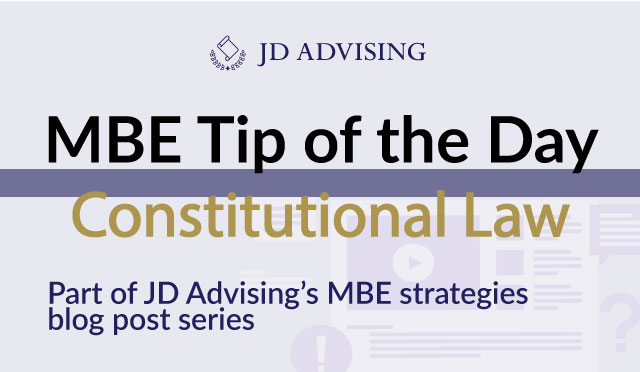MBE Tip of the Day: Constitutional Law
MBE Tip of the Day: Constitutional Law
Welcome to our MBE tip of the day series. This “MBE tip of the day” post focuses on constitutional law.
You will see 25 scored constitutional law MBE questions on the Multistate Bar Exam. In this post, we will review a constitutional law question together. Note that we have posted several MBE tips (which you can find a link to at the bottom of this post) that focus on specific multiple-choice questions that many students answer incorrectly. If you can master these questions, it could increase your MBE score by that many points if you see any of these issues tested again (which, by the way, you will!). These posts of MBE tips and tricks will not only cover substantive law but also strategy. So each “MBE tip of the day” post covers one highly tested area of substantive law as well as an important MBE strategy. You can sign up to receive these posts directly to your inbox for the upcoming administration at the bottom of this page.
MBE Tip of the Day: Constitutional Law
MBE Tip of the Day Instructions:
Do your best to answer this constitutional law MBE question (before even looking at the answer choices and before looking at the answer below!) Ask yourself: What is the subject? What is the legal issue? What is the rule and analysis? What is the conclusion? Try to answer these beginning questions before even reading the answer choices. Then, uncover the answer as well as read more about our MBE tip of the day.
Show the Constitutional Law MBE Question
Constitutional Law MBE Question
A state passed a statute that conditioned the holding of a classroom teacher position in all K-12 public schools in the state on being a citizen of the United States. A group of teachers that were denied employment on the basis of their citizenship challenged the constitutionality of this statute in state court.
Assuming there are no issues in terms of standing, what is the most likely outcome of their challenge?
(A) The statute will be deemed constitutional as it is rationally related to a legitimate governmental interest.
(B) The statute will be deemed constitutional as it is substantially related to an important governmental interest.
(C) The statute will be deemed unconstitutional as it is not narrowly tailored to achieve a compelling governmental interest.
(D) The statute will be deemed unconstitutional as it infringes on a legislative area that is exclusively reserved for the United States Congress.
Subject:
Legal Issue:
Legal Rule and Analysis:
Choose an answer choice that most closely matches your conclusion and explain why the others are incorrect:
Show the Answer to the MBE Question...
Answer to the Constitutional Law MBE Question
Subject: Constitutional Law
Legal Issue: Equal Protection
Legal Rule and Analysis: An equal protection issue is present when the government treats two classes of people differently. The Equal Protection Clause applies to the federal government through the 5th Amendment and to state governments through the 14th Amendment. The level of scrutiny used to analyze the action depends on the type of class discriminated against as well as the type of right the law is related to.
Strict scrutiny will apply to fundamental rights and classifications based on alienage (by the state), race, or ethnicity. If the federal government is the one discriminating on the basis of alienage, rational basis will apply. Further, if the state is discriminating on the basis of alienage when restricting who can perform government functions, rational basis will apply (the political function exception). These laws will only be deemed unconstitutional if the plaintiff can show that the law bears no rational relation to a legitimate governmental interest.
In this case, the state is the one passing a law that discriminates on the basis of alienage. Thus, an equal protection challenge is present, and strict scrutiny will apply unless the law is relating to the performance of a political function. Here, this law is restricting those who are not United State citizens from holding positions as public school teachers. The United States Supreme Court has already deemed public school teachers to be performing political functions. Ambach v. Norwick, 441 U.S. 68 (1979). Thus, a state government does not need to meet strict scrutiny in order to pass a law restricting non-citizens from becoming public school teachers. Rational basis will apply. Since the Supreme Court has already decided this issue, it is highly likely that the law in question will be deemed constitutional.
Conclusion: The statute will be deemed constitutional because it is rationally related to a legitimate governmental interest.
Look at the answer choices provided. Choose an answer choice that matches your conclusion. Review the other answer choices provided.
The answer choice (A) is therefore correct. (B) is incorrect this implies the standard being used is intermediate scrutiny, and this is not the proper standard. (C) is incorrect because not only does it reach the incorrect conclusion regarding constitutionality, but it applies a strict scrutiny standard, which is not appropriate since the political function exception applies. (D) is incorrect because while the issue of immigration itself is considered to be reserved for the federal government, the states are still free to make statutes that create classifications based on alienage as long as the statute can withstand the requisite level of scrutiny.
MBE Tip: Memorize major Supreme Court decisions and pay attention to recent landmark cases. The Examiners like to model both MBE and essay questions on existing major opinions or recently decided relevant issues. Memorizing the past cases that have been critical in shaping our judicial landscape can certainly help you pick up a few points on the bar exam by knowing how the courts apply the rules. By being familiar with judicial opinions, you’ll be a step ahead on exam day!
Show Summary of the Two Key Takeaway Points for the Day
Key Takeaways and MBE Tips From Prior Posts
Takeaway for the Law: A state statute that discriminates on the basis of alienage in relation to a political function will be subject to the rational basis standard of review, not strict scrutiny.
MBE Tip: Memorize historic and recent landmark opinions!
If you would like to see “MBE tip of the day” posts from prior days, please check out all of our past MBE tip of the day archives here! We have several of them and we list them by subject!
Looking for additional MBE help? If you are looking for MBE help, read our 10 expert MBE tips here. Check out our step-by-step guide to improving your MBE score, please review this post for an overview of tips. If you would like to have the next MBE tip emailed to you when we come out with another one, please fill out the form below.
MBE Tip of the Day
Seeking MBE Assistance?
Seeking MBE Assistance?
- 📘 MBE Guide: Equip yourself with our FREE expert-crafted bar exam and MBE guides.
- Free Bar Exam Resource Center: Discover top resources, articles, and free webinars led by renowned bar exam professionals.
Top Resources as Vouched by our Students:
- MBE One-Sheets: One of our most highly acclaimed bar exam supplements!
- Bar Exam Outlines: Our comprehensive and condensed bar exam outlines present key information in an organized, easy-to-digest layout.
- MBE Private Tutoring: Opt for personalized, effective strategies.
- On Demand Bar Exam Course: Comprehensive bar exam preparation.
- Bar Exam Crash Course and Mini Outlines: Acclaimed and effective for a quick refresher.
- MBE Mastery Class, Real MBE Questions, and MBE Guide: Elevate your MBE preparation with these high-quality MBE supplements!
🔥 NEW! Check out our Repeat Taker Bar Exam Course and get introduced to our unmatched platinum Guarantee Pass Program.






Leave a Reply
Want to join the discussion?Feel free to contribute!